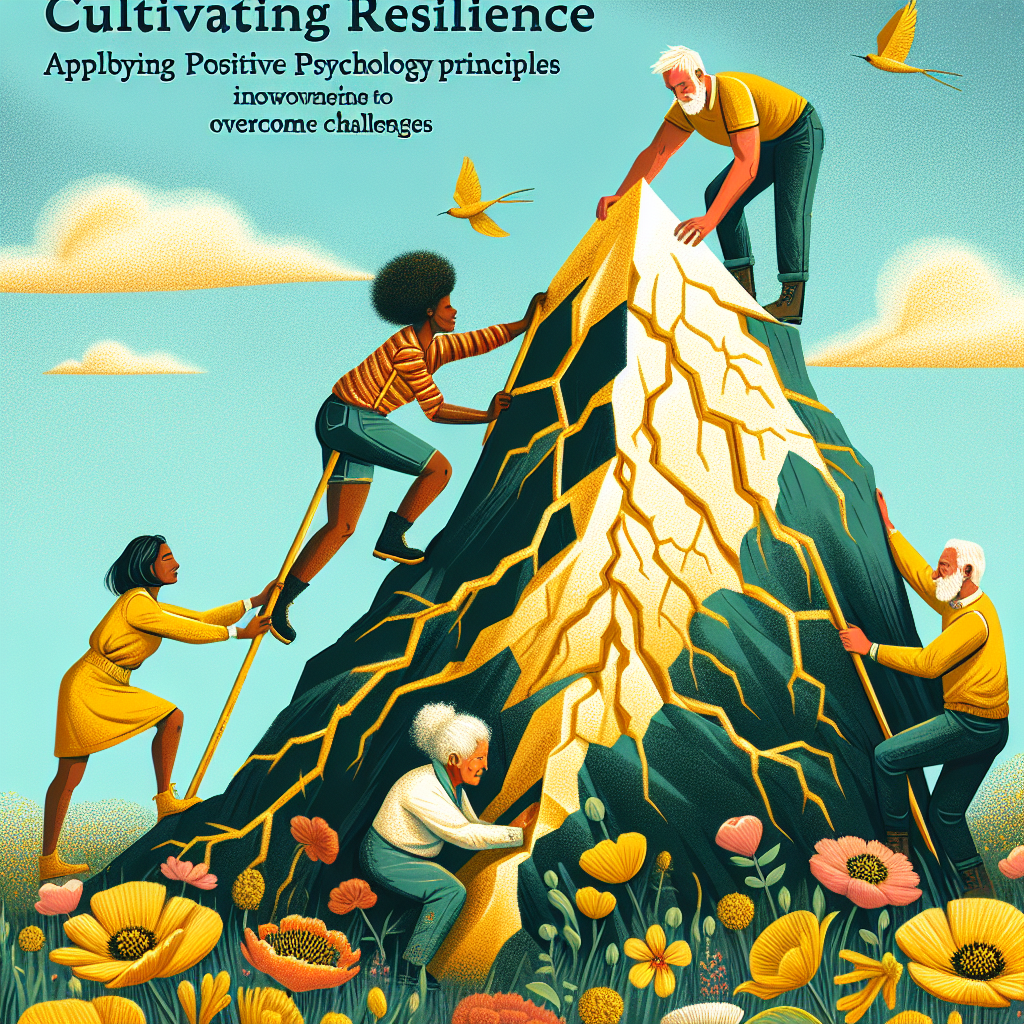Cultivating Resilience: Applying Positive Psychology Principles to Overcome Challenges
Resilience is the ability to bounce back from adversity, to adapt and thrive in the face of challenges and setbacks. It is a key characteristic of mental and emotional well-being, and is crucial for success in all areas of life. In recent years, the field of positive psychology has shed light on the importance of resilience and provided valuable insights into how it can be cultivated and strengthened.
Positive psychology focuses on building strengths and fostering positive emotions, rather than solely addressing deficits and weaknesses. By emphasizing the power of positive thinking, mindfulness, and self-care, positive psychology offers practical tools and strategies for developing resilience and overcoming obstacles. In this article, we will explore some of the key principles of positive psychology that can help you build resilience and navigate life’s challenges with confidence and grace.
Principle #1: Cultivate a Growth Mindset
One of the foundational principles of positive psychology is the idea of a growth mindset, as opposed to a fixed mindset. People with a growth mindset believe that their abilities and intelligence can be developed through effort and perseverance, whereas those with a fixed mindset believe that their abilities are fixed and cannot be changed.
Cultivating a growth mindset can help you approach challenges with a sense of optimism and curiosity, rather than fear and defeat. By viewing setbacks as opportunities for learning and growth, you can develop resilience and persevere in the face of adversity. Embrace challenges as opportunities to stretch and grow, rather than as threats to your self-esteem or identity.
Principle #2: Practice Gratitude and Positive Thinking
Gratitude is a powerful tool for cultivating resilience and promoting mental well-being. By focusing on what you are grateful for, rather than dwelling on what is lacking or missing in your life, you can shift your perspective and build a reservoir of positive emotions. Regularly practicing gratitude can help you appreciate the good in your life, even in the midst of challenges and setbacks.
Positive thinking is another important aspect of resilience. By focusing on the positive aspects of a situation, rather than ruminating on the negative, you can build a more balanced and resilient mindset. When faced with difficulties, try to identify the silver linings and opportunities for growth and learning. By cultivating a positive outlook, you can build resilience and bounce back from adversity with greater ease.
Principle #3: Develop Mindfulness and Self-Compassion
Mindfulness is the practice of being fully present and aware of your thoughts, feelings, and sensations, without judgment or attachment. By developing mindfulness skills, you can become more attuned to your inner experiences and better equipped to navigate challenges with grace and resilience. Mindfulness can help you cultivate a sense of calm and clarity, even in the midst of chaos and uncertainty.
Self-compassion is another key component of resilience. By treating yourself with kindness and understanding, rather than harsh criticism and self-judgment, you can build a strong foundation of self-worth and resilience. Be gentle with yourself when facing challenges, and remember that setbacks and failures are a natural part of the human experience. By practicing self-compassion, you can cultivate resilience and inner strength in the face of adversity.
Principle #4: Build Strong Social Support Networks
Connection and belonging are essential for resilience and well-being. By building strong social support networks, you can cultivate a sense of belonging and community that can sustain you through difficult times. Reach out to friends, family, and colleagues for support and encouragement when facing challenges, and offer your own support to others in return. By fostering strong social connections, you can build resilience and weather life’s storms with greater ease.
FAQs about Cultivating Resilience
Q: How can I develop a growth mindset?
A: To develop a growth mindset, practice reframing challenges as opportunities for growth and learning, rather than threats to your self-esteem. Embrace setbacks as stepping stones on your journey toward success, rather than roadblocks to your goals. By approaching challenges with curiosity and optimism, you can cultivate a growth mindset and build resilience in the face of adversity.
Q: How can I practice gratitude and positive thinking?
A: To practice gratitude, try keeping a gratitude journal and writing down three things you are grateful for each day. Focus on the small blessings in your life, such as a beautiful sunrise or a kind gesture from a friend. To cultivate positive thinking, challenge negative thoughts and beliefs with positive affirmations and reframes. By focusing on the positive aspects of a situation, you can build a more resilient and optimistic mindset.
Q: How can I develop mindfulness and self-compassion?
A: To develop mindfulness, practice regular meditation and mindfulness exercises to cultivate present-moment awareness and self-acceptance. Allow yourself to experience your thoughts and feelings without judgment or attachment, and cultivate a sense of calm and clarity in the midst of chaos. To practice self-compassion, treat yourself with kindness and understanding, especially when facing challenges and setbacks. Remember that you are only human, and that setbacks and failures are a natural part of the human experience.
Q: How can I build strong social support networks?
A: To build strong social support networks, reach out to friends, family, and colleagues for support and encouragement when facing challenges. Cultivate meaningful connections and relationships with people who uplift and inspire you, and offer your own support and encouragement to others in return. By fostering strong social connections, you can build resilience and weather life’s storms with greater ease.




Leave A Comment